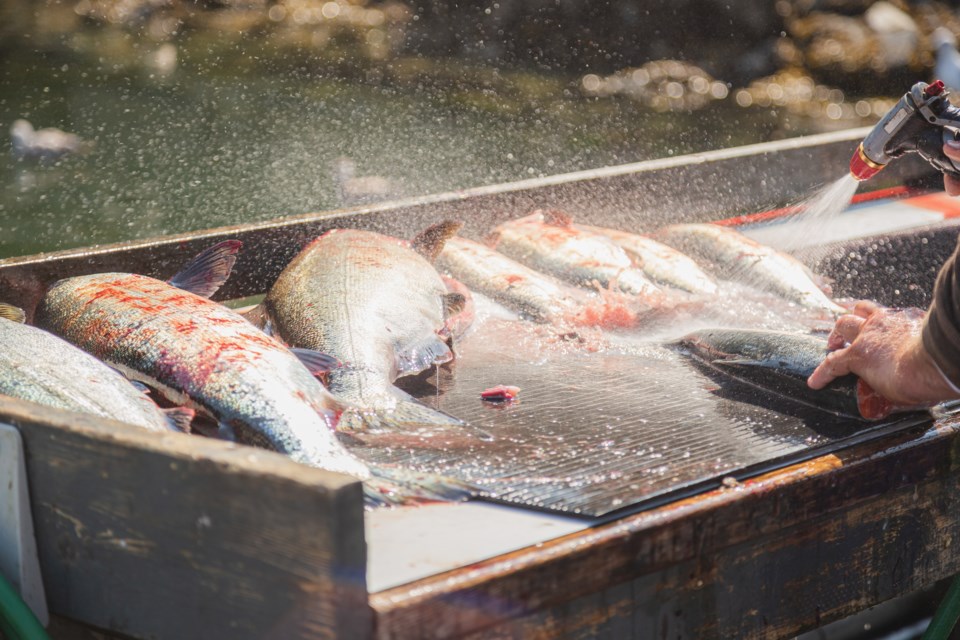A Prince Rupert provincial court judge has fined two B.C. men and a company convicted of salmon fishery offences at total of $95,875 in two separate cases.
In one decision, Judge David Patterson found that Adam Munro, Silas Levesque and ATM Fishing Ltd. exceeded their chinook salmon quota as set out in the federal Fisheries Act. Patterson said those offences occurred between July 22 and Aug. 9, 2018, near Masset on Haida Gwaii.
Patterson found that Munro, Levesque, and ATM possessed fish caught in contravention of the act or its regulations. Those offences happened between July 22 and Aug. 15, 2018, near Masset or elsewhere in B.C.
The judge ruled that Levesque, as master of the Wind Walker I, failed to comply with a licence condition. That condition required him to submit data forms known as fish slips no later than seven days after landing. Those events took place between July 28, 2018 and Nov. 5, 2019, near Masset, Patterson said in his Jan. 6 decision.
The judge said throughout 2018, Munro was the owner of the Wind Walker I, a vessel licensed to participate in B.C.’s Salmon Area F Salmon Troll Fishery. Levesque was the skipper. The vessel's licence conditions allowed for the catch and retention of 390 chinook salmon in 2018.
According to the ruling, on July 22, 2018, 357 chinook salmon were offloaded from the Wind Walker I in Prince Rupert. Then, on Aug 8, 2018, 327 chinook were offloaded. That's 294 more fish than allowed.
The second case
In the second case, Patterson found that the Crown had proven four charges under the act against Munro and 605463 B.C. Ltd.
Michael Andrew Bullock is the sole director and officer of 605463 B.C. Ltd., Patterson said. Munro was the skipper or vessel master of the Winter Wind.
The charges were exceeding maximum quota, between July 22, 2018 and Aug. 11, 2018, near Masset, failing to ensure that catch service logs were delivered between April 30, 2019 and July 17, 2019, selling fish caught in contravention of the act and possessing fish caught in contravention.
On July 22, 2018, Munro and 605463 B.C. Ltd. offloaded 346 chinook salmon caught on the Winter Wind. They were left with a remaining quota of 44, unless another licence holder transferred a share of their total allowable catch to the Winter Wind.
It had been anticipated that a quota transfer to the Winter Wind was going to occur.
However, that didn’t happen and, on Aug, 11, 2018, the vessel was 217 chinook salmon over its limit.
“Therefore, 217 were illegally fished for, possessed and sold,” Patterson said.
The defence
In the first case, defence lawyers suggested that a transfer of total allowable catch to the accused had not been done.
Moreover, they argued, Munro and Levesque had not simply gone out and overfished. Rather, they said, there had been a breakdown in the transfer of the allowable catch.
“This is a case in which Munro and Levesque went out and did what they thought was supposed to be done,” Patterson quoted the defence as saying. “They tried to follow the rules but did not use due diligence.”
In the second case, the defence argued there was a mistaken belief the catch transfer had been done. The defence characterized the situation as a "record-keeping offence."
Sentence
In the first case, Patterson, said a failure to submit data within seven days of landing was also an issue.
Fish slips are created to record the value of fish sold by B.C. commercial fishers working in British Columbia. The federal Department of Fisheries and Oceans (DFO) retains such data as a statistical record of the landing of a fishing trip. It includes information such as the vessel master’s name, vessel name, plant name, fishing date, lending date, area fished, trip length, type of gear used, species, weight, price, form and value.
DFO uses the information on the slips to create catch statistics.
“The failure to submit the fish slips was a flagrant breach of a fundamental licence condition,” he said. “The data provided by the fish slips is crucial to the ability of DFO to manage the fisheries for the benefit of all Canadians properly.”
The judge concluded the defendants should have ensured the quota reallocation should have been taken care of before the Wind Walker I left port.
Patterson ruled the monetary benefit received by the defendants for the overcatch was $43,075.50. He split that between the two at $21,537.75. He fined Munro a further $3,500 and Levesque $8,500.
In the Munro-605463 B.C. Ltd. case, Patterson said the defendants accepted responsibility for not doing due diligence on the catch transfer.
“The defendants knew what needed to be done,” the judge said. “They did not do what needed to be done through either carelessness or laziness. It was no oversight or forgetfulness.”
He fined Munro and 605463 B.C. Ltd. $20,400 each.



